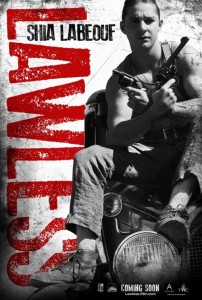Posts Tagged ‘Jason Clarke’
Gravity Swallows Light
Oppenheimer
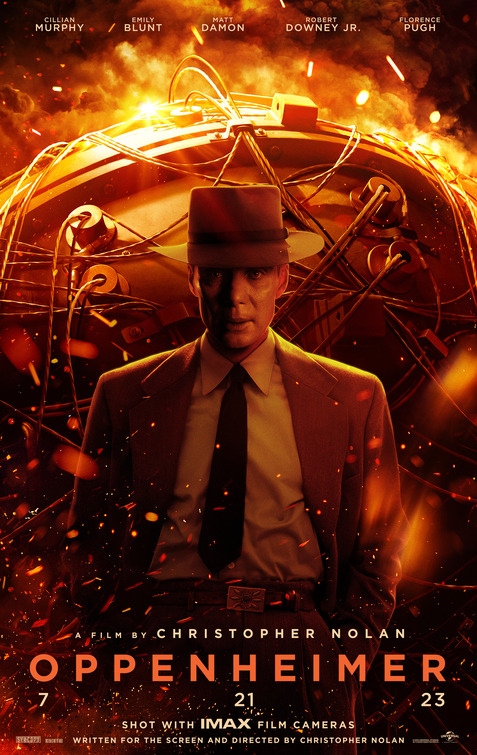
Director: Christopher Nolan
Cast: Cillian Murphy, Emily Blunt, Robert Downey Jr, Josh Hartnett, Matt Damon, Tom Conti, Dane DeHaan, Casey Affleck, Kenneth Branagh, Gary Oldman, Florence Pugh, Alden Ehrenriech, Scott Grimes, Jason Clarke, Tony Goldwyn, James D’Arcy, Gregory Jbara, David Krumholtz, Matthias Schweighofer, Alex Wolff, Jack Quaid, Michael Angarano, Matthew Modine, David Dastmalchian, Josh Peck, Rami Malek, Christopher Denham, James Remar, Olivia Thirlby, Gustaf Skarsgard, Jefferson Hall, Louise Lombard
Running time: 180 minutes
Film Rating: 9.5 out of 10
The sheer magnitude of director Christopher Nolan’s biographical historical drama Oppenheimer is hugely impressive. In fact it is the director’s Magnum Opus – his historical masterpiece. Nolan’s idea of making a film about the Manhattan Project was hinted at in the Mumbai scene in his 2020 time bending espionage film Tenet.
Unlike most historical biographies which follows a chronological narrative structure of displaying dates and locations, Nolan throws out the rule book and instead dazzles the viewer, challenging them in every frame with a multitude of different scenes occurring concurrently, skilfully playing with time frames but ultimately building up a character of a very intelligent but complex man, J. Robert Oppenheimer, the father of the Atomic Bomb, the Sphinx Guru of Atoms as one of his colleagues call him just after the succesfull Trinity Test in Los Alamos, New Mexico in 1945 as part of the ultra-covert Manhattan Project.
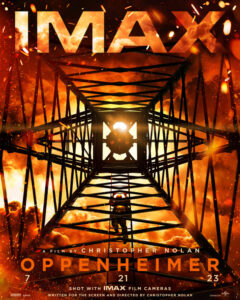
For what Oppenheimer discovers, the harnessing of atomic energy, its military significance will ultimately overshadow its scientific genius much like gravity swallowing light.
At the centre of Oppenheimer, are three great performances. Cillian Murphy is captivating as J. Robert Oppenheimer, a gifted but conflicted scientist who even consults with Albert Einstein, a scene stealing moment featuring British character actor Oscar nominee Tom Conti (Shirley Valentine; Rueben, Rueben). Then Oscar nominee Robert Downey Jr (Chaplin) shows off his skilful acting abilities as the devious and vindictive Lewis Strauss, the head of the Atomic energy Commission who is out to get Oppenheimer, a sort of Cassius figure that seeks the downfall of an influential leader.
Oscar nominee Florence Pugh (Little Women) as the seductive communist Jean Tatlock, Oppenheimer’s former girlfriend and part time sex siren is tantalizing as a defiant yet traumatised woman caught up with a complicated man on the brink of changing the world forever, just as geopolitics in the World War II era was shifting beyond recognition, from the age of mortal combat to nuclear annihilation. Tatlock’s character resembles the allure of communism in the late 1920’s when it was fashionable amongst the intelligentsia in bohemian circles, before the political system’s failures were tested and exposed.
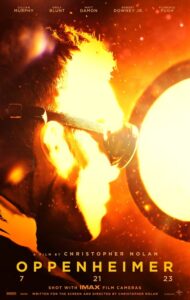
Christopher Nolan expects his viewers to be historically literate, because as a history buff with an Imax camera, he is out to impress you, dazzle you with a superb epic, flipping between decades complete with oblique historical reference points from the Spanish Civil War to Hitler’s invasion of Poland in 1939 to the trials of communists during the witch hunts of McCarthyism in 1950’s America. You have to be up to date with this knowledge because as an auteur director Nolan demands a sophisticated audience.
With crisp cinematography by Oscar nominee Hoyte Van Hoytema (Dunkirk) and a jarring musical score by Oscar winner Ludwig Goransson (Black Panther), Oppenheimer is a cinematic feast which displays a competent universe of stars, a host of talented actors and many cameo’s that make up this epic, an overtly masculine take on a monumental historical figure filled with urgency and military importance, strategic significance and ethical complexity.
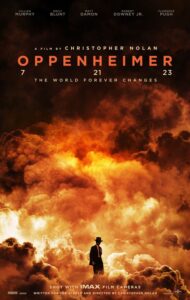
Whether celebrated or later despised as expertly crafted by Christopher Nolan who also wrote the screenplay, Oppenheimer is painted as a flawed but inventive scientist who gets too involved in the industrial military complex, represented by Matt Damon’s brute force army character Leslie Groves, while his past flirtations with communism were scrutinized as he had top level security to the hydrogen bomb that he built and created, which Truman used unblinkingly to bomb the Japanese cities of Hiroshima and Nagasaki to end World War II in August 1945.
Oppenheimer is an intelligent multidimensional film about the controversial father of the Atomic Bomb set in an era when the world was changing too fast for the population to realize the consequences.
Oppenheimer gets a film rating of 9.5 out of 10 and is an intelligent dissection of the moment the world changed forever. Highly recommended viewing.
To the Moon and Back
First Man
Director: Damien Chazelle
Cast: Ryan Gosling, Claire Foy, Jason Clarke, Corey Stoll, Ciaran Hinds, Kyle Chandler, Patrick Fugit, Christopher Abbott, Olivia Hamilton, Pablo Schreiber, Shea Whigham, Lukas Haas, Corey Michael Smith
Thanks to a preview screening organized by United International Pictures at Suncoast Cinecentre, Durban, I was fortunate enough to see director Damien Chazelle’s highly anticipated Neil Armstrong biopic First Man starring an excellent Ryan Gosling and Golden Globe winner Claire Foy as his wife Janet Armstrong.
First Man was based on an intelligently written screenplay by Josh Singer based upon the James R. Hansen book First Man: The Life of Neil Armstrong.
In the space race between America and the Soviets in the 1960’s, there was a desperate bid to successfully land a man on the moon, a pledge that iconic President John F. Kennedy made to the American public which in turn put pressure on NASA to not only train astronauts but successfully prepare them physically, psychologically and emotionally for a lunar trip.
What the Oscar winning director of La La Land Damien Chazelle does so beautifully is contrast the massive effort and technical implications of sending men to the moon with a complex family drama about Neil and Janet Armstrong as they desperate recover from the death of their young daughter Karen from a Brain Tumour.
Not only does this tragedy pull on the fabric of their marriage, but its Neil Armstrong’s absolute determination that he is going to be the first man on the moon and be the best astronaut America has ever seen. Oscar nominee Ryan Gosling (La La Land, Half Nelson) gives a nuanced performance as Neil Armstrong, a father continually haunted by the death of his young daughter while the moon taunts him every evening, as if to say when are you actually coming to visit me?
Janet Armstrong superbly played by Claire Foy who deserves an Oscar nomination for her performance grows increasingly frantic at the prospect that while she has to be a mother to two young boys, there is a real danger that her husband might not return from a dangerous mission to the moon because of the infinite dangers involved.
In contrast to the familial tension at home, the actual attempts to get to the moon are impressively captured onscreen with mesmerizing sound effects suitably accompanied by an incredible musical score by Oscar winner Justin Hurwitz (La La Land) which truly makes First Man a remarkable and utterly impressionable film – This is truly great cinema held together by cerebral images and perfect on point portrayals of Neil and Janet Armstrong by Ryan Gosling and Claire Foy, who both brilliantly hold the film together emotionally and psychologically.
Audiences should watch out for a superb cameo by Corey Stoll as the outspoken Buzz Aldrin who feels nothing about remarking about an astronaut’s failure at his own funeral or how he was not a good pilot.
First Man is a complex, intelligently directed portrayals of one of the defining moments of the 20th century – Neil Armstrong’s historic walk on the Moon and the build up which preceded this significant event.
Highly recommended viewing, First Man receives a film rating of 9.5 out of 10 and is truly a cinematic achievement that will take audiences literally to the moon and back. Utterly superb.
The Fourth Son of a Political Dynasty
Chappaquiddick
Director: John Curran
Cast: Jason Clarke, Kate Mara, Olivia Thirlby, Ed Helms, Bruce Dern, Jim Gaffagan, Taylor Nichols, Lexie Roth
Many films have been made about the Kennedys or those related to them, most recently being Pablo Larrain’s beautiful film Jackie featuring an Oscar worthy performance by Natalie Portman.
While The Painted Veil director John Curran’s film Chappaquiddick is no masterpiece and is quite slow moving, it nevertheless remains a fascinating account of one of the Kennedy’s lesser known political scandals.
This involved Senator Edward Kennedy, superbly played by Australian actor Jason Clarke (Zero Dark Thirty, The Great Gatsby), who was the fourth son of the Kennedy clan and the only surviving son after his three older brothers died successively.
Chappaquiddick takes place in Martha’s Vineyard in the summer of 1969, two days before American astronaut Neil Armstrong successfully landed on the moon. Edward Kennedy and his cousin Joseph Gargan played by The Hangover star Ed Helms host a small decadent party on Chappaquiddick an island off Martha’s Vineyard in Massachusetts. Among the guests is Mary Jo Kepechne played by former House of Cards star Kate Mara who gets fatally entangled with Senator Edward Kennedy.
As the evening progresses Edward and Mary Jo go on a moonlight drive around the island but this romantic venture turns into tragedy when after becoming intoxicated Edward unknowingly drives the car off a low bridge and it plunges into a river and he escapes the accident unscathed, while poor Mary Jo gets trapped in the drowning automobile and dies. The worst part is that Edward Kennedy walked away from the scene of a fatal accident and then later tried to cover it up using his family’s considerable political influence.
Chappaquiddick deals with the aftermath of the tragic event and the engulfing political scandal it could have for the ambitious Senator Edward Kennedy who is desperate to follow in his two older brothers’ political careers with JFK becoming US president and Robert Kennedy becoming a US senator, both of whom got assassinated during the turbulent 1960’s.
What makes Chappaquiddick so fascinating is the way in which Edward Kennedy, with a cool emotional detachment and often seeking advice from his wheelchair bound father Joseph Kennedy, wonderfully played by veteran actor and Oscar nominee Bruce Dern (Nebraska) whose only word of wisdom is alibi.
The patriarch of the powerful political dynasty which is the Kennedys, based at their family compound in Hyannis port, Massachusetts, is determined to protect the Kennedy legacy, despite numerous tragic events and subsequent scandals.
Chappaquiddick is a riveting historical drama about a political scandal which literally gets eclipsed by the men landing on the moon on the same weekend. As compared to Jackie, Chappaquiddick lacks grandiosity and elegance, but remains relevant as to how political scandals are essentially covered up and the flow of information is conspicuously controlled.
Recommended for viewers that enjoy American historical films, Chappaquiddick gets a film rating of 7 out of 10. My only criticism is that sections of the film could have been edited to avoid repetition and the script required insightful dialogue.
Caesar’s Reign
Dawn of the Planet of the Apes
Director: Matt Reeves
Cast: Jason Clarke, Keri Russell, Gary Oldman, Kodi Smit-McPhee, Andy Serkis, Toby Kebbell, Judy Greer
In a post-apocalyptic San Francisco where much of the human population has been decimated by a simian virus, the apes rule north of the Golden Gate Bridge, which would be modern day Sausalito. These apes are wily, intelligent and they are packing, ready to defend their reclaimed territory.
In Cloverfield director Matt Reeves’s impressive and handsome sequel to the 2011 film Rise of the Planet of the Apes, Dawn of the Planet of the Apes shows a different world where the remnants of humanity are threatened by gangs of warring apes. These apes are ruled by Caesar a compassionate commander who has a soft spot for humanity as he was the original ape in the first film.
Into their simian territory ventures a group of humans eager to restore power to a hydroelectric plant in Sausalito lead by Malcolm, a brave and compassionate man, played by Zero Dark Thirty’s Jason Clarke. Accompanying Malcolm is his wife Ellie played by Keri Russell (from the short lived TV Series The Americans) and his son Alexander played by Kodi Smit-MacPhee.
Malcolm and his family have to answer to the leader of the human enclave Dreyfus played by Gary Oldman last seen in Robocop who is more inclined to destroy the nearby ape population than befriend them.
The encounter between apes and humans starts off fairly smoothly but soon tyranny and violence takes over as an insurgency against Caesar lead by a rather mean monkey Koba (played by Toby Kebbell) threatens to destroy both the apes and humans. Caesar’s reign is naturally disrupted and warfare ensues.
Dawn of the Planet of The Apes is superbly done with outstanding visual effects and a brilliantly executed plot line featuring likable characters giving both the humans and apes equal attention and justifiable screen time. As with both humans and apes, there is lurking the potential for conflict which naturally exists in any seemingly homogenous community. If viewers don’t like seeing Apes on horseback wielding automatic weapons then they best miss this film.
More significantly in anthropological terms this film represents in real and fictitious terms the relationship between two species or them and us and how each group perceives the other. Points to director Matt Reeves who really makes this sequel credible, exciting and intuitive. Recommended viewing for those that enjoyed Rise of the Planet of the Apes.
Evading the Threat Matrix
White House Down
Director: Roland Emmerich
Cast: Channing Tatum, Jamie Foxx, James Woods, Jason Clarke, Jimmi Simpson, Maggie Gyllenhaal, Nicholas Wright, Richard Jenkins, Lance Reddick, Matt Craven
Historians have concluded that the decline of the Roman Empire happened from within due to the increasing barbarization of the army protecting its vast borders. In Roland Emmerich’s impressive White House Down, the same can be said for the paramilitary group which attack America’s presidential palace with impunity in retaliation for the President pulling out all US armed forces from the Middle East.
Although this Decline of the American Empire is nowhere near as subtle or brilliant as the Canadian film version by Denys Arcand, White House Down is a more intricately plotted action thriller than Antoine Fugua’s thematically similar film Olympus Has Fallen. Both films, have similar plot points and follow an almost identical narrative except that in White House Down, the enemy is not a bunch of gun totting Koreans, but a right wing American paramilitary group who have slipped through the threat matrix.
What makes Emmerich’s White House Down a better picture than Olympus has Fallen, is that there is more background characterization making the motives for such an attack on the White House infinitely more credible thanks to the inventive screenwriting of James Vanderbilt. Whilst Gerard Butler and Aaron Eckhart do not have as much bonding time in Olympus Has Fallen, the two stars of White House Down, Channing Tatum (Magic Mike, The Vow) as wannabe secret service agent John Cale and likeable African American president Sawyer, played with a humorous twist by the ever watchable Jamie Foxx (Django Unchained, Collateral), make for the teaming of two brilliant leading men. The rest of the cast consists of the experienced Maggie Gyllenhaal as Finnerty, James Woods as Walker head of the Secret Service and the brilliant Richard Jenkins as the Speaker Raphelson.
Emmerich also manages to capture the historical significance of the White House as Cale and his news savvy daughter are first taken on a tour of the White House, during which the vicious paramilitary group lead by the ubiquitous Australian actor Jason Clarke (The Great Gatsby, Lawless, Zero Dark Thirty) playing ex-special ops strongman Stengz start planning their Coup d’Etat. In a precursor of what’s install, there is even a painting showed in one scene of the film, showing the newly built 19th century White House up in flames during the Burning of Washington by the British Army in 1812, the only time a foreign power has ever occupied the American capital – http://en.wikipedia.org/wiki/Burning_of_Washington.
Whilst the characterization and historical back story of the first half of White House Down make for fascinating viewing, the second half of the film transcends all sense or sensibility as all the American presidential icons from Air Force One to the famed White House are blown to smithereens. The action is nevertheless stimulating whilst the film does appear to veer towards a very unsubtle level of American patriotism not seen on the big screen since Olive Stone’s Born on the Fourth of July. White House Down is sure to keep audiences spellbound by the fantastic special effects and brilliantly orchestrated bid budget action sequences which is expected from the director of such blockbusters as Independence Day, 2012 and The Day After Tomorrow.
White House Down like Emmerich’s previous films is not without some wonderful comic touches, making the characters human in times of a crisis, despite some of their intentions, from the White House tour guide Donny played by Nicholas Wright to the diabolical techno guru Tyler, played by Jimmi Simpson (Zodiac) hacking into Presidential compound’s mainframe computer whilst listening to Beethoven’s 5th, or the sneaker clad US President Sawyer arming himself with a rocket launcher as they race around the White House’s pristine lawn in one of the film’s best chase sequences. Just imagine Obama doing that?
Recommended viewing for lovers of big budget action films, and unadulterated American patriotism. See White House Down to believe it!
Lavish, Lustful Long Island…
The Great Gatsby
Director: Baz Luhrmann
Cast: Leonardo DiCaprio, Tobey Maguire, Carey Mulligan, Elizabeth Debicki, Isla Fisher, Joel Edgerton, Jason Clarke, Amitabh Bachchan
The much anticipated glitzy remake of the 1974 film, The Great Gatsby by Australian director, Baz Luhrmann is spectacular to watch, wonderful to marvel at, yet ultimately flawed much like its central character, Jay Gatsby. Based upon the American classic novel by F. Scott Fitzgerald, The Great Gatsby published in 1925, chronicling America and specifically New York’s Jazz Age, Prohibition and the excesses of wealth prior to the Great Depression in 1929, Luhrmann expertly captures the era with gorgeous costumes designed by Catherine Martin and supplied by the Italian Luxury Fashion House Prada along with suits by Brooks Brothers, the 21st century film version of Gatsby is brash, excessively long and gorgeous to look at, with fabulous over the top parties, superb music and lots of creative divergence as expected from the director of Moulin Rouge and Romeo and Juliet.
At the centre of the 21st century version of The Great Gatsby are three fine performances and that is the ménage trio of Jay Gatsby, played with a slightly Howard Hawks neurosis by Leonardo di Caprio, (The Aviator, Django Unchained, Romeo and Juliet), the Louisville heiress Daisy Buchanan played with a slight childish melancholy by the ever charming Carey Mulligan (Wall Street 2, Money Never Sleeps) and then her brutish, polo playing husband Tom Buchanan, an outstanding performance by screen newcomer Joel Edgerton (Warrior, Animal Kingdom).
Luhrmann and costume designer Martin do a superb job of luring the audience into a decadent world of the bootlegging roaring 1920’s New York with the lavish excessive parties, the ensuing deviance that prohibition encouraged and naturally the modern jazz age. The film is told through the eyes of Nick Carraway, Daisy’s cousin and neighbour to the initially enigmatic Gatsby, played with the usual awe and wonder of Tobey Maguire, of the original Spiderman Trilogy, who facilitates a meeting between Daisy and Gatsby over tea in one of the film’s more memorable scenes with flowers and decadent cakes at his Long Island cottage.
The Long Island-Manhattan social scene becomes more intricate as Tom’s mistress Myrtle wonderfully played by Isla Fisher and first introduced at in a raucous party at a Manhattan apartment hinting at the excesses which the sexually ambivalent Nick Carraway is seduced by both in terms of drugs, alcohol and loose morals, yet it is really Carraway’s enchantment with Gatsby himself which really plays into the subtext of such a fascinating portrait of lust and decadence, that eventually leads him to later write the story of the huge influence Gatsby had on his now destroyed life. As Carraway is drawn into the opulent world of the super-rich and of the myriad possibilities, betrayals and affairs that this affluent society leads him to witness, it is Gatsby himself who leaves Carraway with an impressionable dream of “You can do anything if you set your mind to it”.
Luhrmann’s The Great Gatsby is flawed and uneven, especially noticeable in the second half of the film as he goes beyond the spectacle of the age and grapples with the deceit and lies that his main characters are capable of. The infamous scene at the Plaza Hotel, where all is revealed is really expertly played by Joel Edgerton as the jilted yet scheming playboy husband, who treats all his possessions including his lovely wife with a sort of contemptible jealousy. Luhrmann’s directorial trademarks are evident in The Great Gatsby, but not nearly as tightly pulled together as his brilliant Moulin Rouge which saw stunning performances by Ewan McGregor and Nicole Kidman, yet he still manages to recreate The Great Gatsby in a style any other film director could not have imagined.
The Great Gatsby is recommended for the fantastic costumes and sumptuous production design, but not where literary traditionalists are concerned, the film is clearly aiming at a much younger glitzier and more diverse audience, notably succeeding in its lavish portrayal of excess. The only criticism is that more editing was required to cut The Great Gatsby into a perfect diamond and not as a sparkling flawed gem. The film is a celebrated depiction and inventive homage to the Jazz Age, without much substance, but loads of style. Personally I would like to see Luhrmann tackle the rather more brilliant novel by F. Scott Fitzgerald, Tender is the Night, but that would see the director venturing too deeply into the complexity of human relationships without the added glamour.
Recommended for lovers of Gershwin music and for an aesthetic appreciation, Baz Luhrmann’s The Great Gatsby is sure to divide and impress audiences simultaneously, much like he did with revisionist adaptation of Romeo and Juliet in 1997. Also starring Jason Clarke, Elizabeth Debicki and Bollywood star Amitabh Bachchan as Meyer Wolfsheim.
Violent Tendencies
LAWLESS
The Road director John Hillcoat’s violent adaptation of the novel The Wettest County in the World by Matt Bondourant is graphic, gritty and riveting. Featuring the bad boys of 21st century cinema, Lawless teams Shia LaBeauf (Wall Street, Money Never Sleeps, Transformers) with Tom Hardy (Warrior, The Dark Knight Rises) and Jason Clarke (Zero Dark Thirty) as the true life Bondourant bootlegging brothers of Franklin County, Virginia, circa 1920.
Narrated by the youngest and naturally the most flashiest brother Jack Bondourant played brilliantly by La Beouf, Lawless tells of how the three brothers enter the bloody world of bootlegging during Prohibition America and how their claim to fame besides their protectiveness of each other is their invincibility. Sooner Jack goes into business with the fugitive Chicago Floyd Banner (a great cameo by Oscar Nominee Gary Oldman) and illegally transports whisky and moonshine across county lines. Up against a sadistic and vain deputy sheriff Charlie Rakes played with a subtle brutality by Guy Pierce (L. A. Confidential), what ensues is a violent turf war brought on by the prohibition and all the illegal, criminal activities which develop at an unrelenting pace.
Jessica Chastain (The Help, Zero Dark Thirty), plays Maggie Beauford the storekeeper and eventual love interest for the seemingly invincible Forrest Bondourant gruffly acted by the ever talented Tom Hardy, whilst the oldest brother Howard, played by Jason Clarke fresh from the horrors of World War 1 is the quiet and slightly sociopathic type. Lawless is a rural gangster film, which moves the action away from the major cities like Chicago, New York and Atlantic City (as seen in the classic The Untouchables and the brilliant HBO series Boardwalk Empire) and depicts the Virginia trio as a tough, seemingly invincible band of brothers who will go to any lengths to protect their operation and survive during the 1920’s and 30’s.
Whilst Lawless focuses too much on the violence, and not enough on the characters motivation, it is clear that all three brothers possess vicious tendencies when protecting themselves and each other in their bid for survival. Mia Wasikowska (Jane Eyre) stars as the Quaker’s daughter Bertha Minnix, a potential love interest for Jack and it’s in scenes between Wasikowska and LaBeouf in which the script is the strongest.
Lawless is a bloody slice in more ways than one of Prohibition era American history and is not for sensitive viewers as director Hillcoat goes for more of the brutality and less of the morality in this gripping tale of brutal brothers surviving against all odds, and proving that when it comes to turf wars, blood is always thicker than moonshine.
Timeline of Terror
Zero Dark Thirty
Oscar winning director Kathryn Bigelow’s brilliant yet riveting film Zero Dark Thirty is a masterful film, held together by a central performance by Jessica Chastain as CIA Intelligence Operative Maya and a superb script by Mark Boal, who also collaborated with Bigelow on the equally impressive The Hurt Locker.
This complex film opens with the flight recordings of the United 93 plane that crashed in Pennsylvania during the September 2001 US Terror attacks sparking an obsessive and frustrating hunt for the Al Qaeda mastermind Osama Bin Laden by the CIA and specifically Maya initially from the hostile environment of Pakistan then based at the CIA headquarters in Langley, Virginia. The narrative charts a veritable timeline of terror that has characterized the first decade of the 21st century, from 9/11 to the London Transport bombings in July 2005, to the Marriott Hotel bombing in Islamabad in September 2008 to the suicide bombing at the American military base, Camp Chapman in Khost, Afghanistan in December 2009.
Zero Dark Thirty is a brilliant spy thriller and unlike Argo, is deadly serious in every respect and is grounded in much historical research and investigative journalism, noted in the detailed script by Mark Boal. As in The Hurt Locker, Bigelow once again casts her central character in a completely hostile and extremely dangerous environment and the petite Maya as the tenacious CIA operative who skilfully leads the hunt for and final execution of Al Qaeda leader Osama Bin Laden, the mastermind behind many international terrorist attacks, most notably 9/11 and the 2005 London bombings.
Bigelow as a director takes on a larger canvas than in the Iraq War in The Hurt Locker and shows that the decade long hunt for America’s most wanted enemy was an international affair from Pakistan to Poland to Kuwait involving CIA black sites, detailed surveillance and lots of political wrangling.
Tradecraft
A notable narrative shift is from the film’s first half set under the Bush administration where torture, rendition and revenge were the CIA’s chief instruments of capturing Al Qaeda terrorists to the second half set after November 2008 under the Obama administration where detailed surveillance, dedication and almost positive certainty of terrorist tradecraft which ultimately lead to the riveting elimination of Osama Bin Laden at a compound in Abbottabad, Pakistan in May 2011, Zero Dark Thirty is deadpan in its presentation of one nations hunt for a master terrorist and the extraordinary sacrifice and lengths these CIA operatives went to in finally achieving their goal.
Jessica Chastain performance is simply superb and has already garnered a 2013 Golden Globe Award and truly shows her talent and diversity in the role of Maya but also points to Kathryn Bigelow ability to bring out the best performance ever in her leading actors, as was the case with Jeremy Renner in The Hurt Locker. The final sequence involving the storming of the Abbottabad compound, believed to be Bin Ladin’s hideout by elite American soldiers is truly nerve-wracking cinema, shot with Bigelow’s trademark directorial detachment cut through with absolute documentary styled realism.
Zero Dark Thirty has a great supporting cast including Jason Clarke as the CIA torturer Dan, Kyle Chandler as CIA Pakistan operations chief Joseph Bradley along with Mark Strong, Jennifer Ehle and James Gandolfini, but it is really Chastain’s obsessive portrayal of CIA Operative Maya, a woman battling to gain respect in a male dominated espionage arena, that shows her true talent. The pace of Zero Dark Thirty is fast and yet measured enough to show the time involved assisted by an original score by Alexandre Desplat and with cutting edge sound editing, the audience is immediately immersed in a deeply fascinating portrait of America’s covert hunt for that nation’s Enemy Number One. Highly Recommended and definitely Oscar worthy.


















